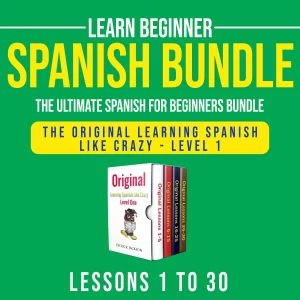Adjectives Part I: General Rules
Adjectives are words that describe or modify a person, place, or thing. Before delving into this lesson, remember one essential fact: all Spanish nouns are either masculine or feminine. Knowing the gender of the noun will make adjectives much easier to understand.
Descriptive adjectives generally follow the noun—yes, the exact opposite of English. Think of a red car as “a car red,” un carro rojo. Remember, Spanish is a different system! Occasionally, descriptive adjectives will precede nouns for dramatic or poetic effect; for your purposes as a beginner, however, use the standard, un-stylized noun-before-adjective convention. (Definite articles like a, an or the come before the noun, as in English.)
Descriptive adjectives may end in –o, -e, or a consonant. Here are the general rules to help you understand and use them accurately:
Adjectives ending in –o
| alto | tall | extranjero | foreign |
| ancho | wide | feo | ugly |
| barato | cheap | frío | cold |
| blanco | white | gordo | fat |
| bonito | pretty | hermoso | beautiful |
| bueno | good | largo | long |
| caro | expensive | limpio | clean |
| cómodo | comfortable | loco | crazy |
| corto | short | malo | bad |
| delgado | thin | moderno | modern |
| delicioso | delicious | sucio | dirty |
| duro | hard | viejo | old |
This list is only a small sample of the most common adjectives ending in –o. Although classified as “ending in –o,” these adjectives actually have four different endings each: masculine, feminine, masculine/mixed plural, and feminine plural. Let’s use limpio as an example. Watch how the ending changes depending on whether we tell about one or more clean rooms (masculine), one or more clean houses (feminine):
el cuarto limpio los cuartos limpios
la casa limpia las casas limpias
Except for the masculine singular, the endings for the article, noun and adjective all match:
el cuarto limpio los cuartos limpios
la casa limpia las casas limpias
Adjectives ending in –e
| elegante | elegant | impresionante | impressive |
| enorme | enormous | inteligente | intelligent |
| excelente | excellent | interesante | interesting |
| fuerte | strong | pobre | poor |
| grande | big | triste | sad |
| importante | Important | verde | green |
Again, this is only a sample of commonly used adjectives ending in –e. These adjectives have only two forms: singular and plural. Gender has no impact on these adjectives. Simply add an s to make these adjectives plural:
el elefante enorme los libros interesantes
la mujer elegante las universidades importantes
Adjectives ending in consonants
| azul | Blue | gris | gray |
| difícil | Difficult | joven | young |
| fácil | easy | oficial | official |
| feliz | happy | popular | popular |
| final | final | tropical | tropical |
As with adjectives ending in –e, most adjectives ending in consonants have only two forms: singular and plural. Gender has no impact on these adjectives. To make these adjectives plural, add –es:
el curso dificil los examenes finales
la canción popular las tormentas tropicales
Practice
Fill in the blanks with the correct form of the adjective in parentheses. For extra credit, translate the paragraph.
Mi madre es una mujer ___________________ (hermoso). Tiene pelo _______________________ (corto) y siempre lleva ropa ________________________ (elegante). Mi mamá no es ________________________ (viejo), pero sí tiene unos pelos _______________________ (gris). Ella parece _________________________ (joven) y tiene ideas _________________________ (interesante). Mami dice que las mujeres _______________________ (moderno) son _________________________ (loco) por preocuparse tanto por la belleza; es major ser una persona _________________________ (feo) y _____________________________ (feliz) que una muñeca _________________________ (bonito) y ___________________________ (triste).
Answers (by sentence):
hermosa
corto, elegante,
vieja, grises
joven, interesantes
modernas, locas; fea, feliz, bonita, triste
My mother is a beautiful woman. She has short hair and always wears elegant clothes. My mom isn’t old, but she does have a few gray hairs. She looks young and has interesting ideas. Mom says that modern women are crazy to worry so much about beauty; it’s better to be an ugly, happy person than a pretty, sad Barbie doll.**
** Muñeca literally means doll, but it is used in many countries to denote a beautiful but empty-headed woman. Translations will vary.





